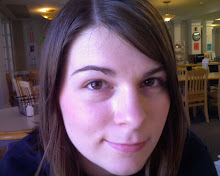Never Let Me Go is an interesting book. It has a sci-fi, dystopian future vibe to it, but in a subtle way (which becomes less subtle toward the end). It technically takes place in the past--1990's in England--but I kept sort of thinking of it like it was in the future anyway. It's just sort of a natural assumption when my brain is in sci-fi mode. But the story itself does plausibly seem like it's set in the near-past because of a few cultural references, and just the general lack of totally out-there technology. The world is pretty normal aside from the fact that in the novel, humans are cloned and used for the sole purpose of organ-harvesting, and even that doesn't seem too far-fetched.
There were a few things that bothered me about this novel, however.
1. The character Ruth is absolutely intolerable. She's the hugest bitch ever, and I felt very little, if any, sympathy for her, even toward the end when she becomes a donor and all the fight drains out of her. I see how she fits into the whole dynamic of the plot and the entire subplot of determining whether or not the clones have souls--she's a very "human" character, complete with plenty of flaws. But she's still very annoying.
2. You know how sometimes an author will beat around the bush when it comes to bearing all the gritty details of the plot? And then there's suddenly a convenient chapter/scene when ALL IS REVEALED, and all the little hints throughout the novel come together when everything is spelled out clear as day? Well, this book has one such chapter. Learning all the details of Hailsham (an exclusive, progressive school where clones are raised as "students" before moving on to meet their inevitable fate as carers and donors) and about the clones themselves was cool and all, but it would have been nice if all that information wasn't revealed at once and under such weak pretenses.
Despite the fact that I didn't like Ruth, and I didn't like the cop-out of revealing everything in a single chapter, it does make sense in terms of the structure of the novel and the emotions I'm sure the author was trying to evoke. Throughout most of the first half of the novel, I felt like I wasn't totally sure what was going on even though my brother had told me a lot about the book before I even started reading it. That is, I began reading with full knowledge that the main characters are clones, and that they were made to serve as organ donors. That information isn't explicitly revealed until well into the book, and is only loosely hinted at through terms like "donor," "completed," "carer," etc. None of these things are actually explained while the narrator (Kathy) is telling her story. She narrates as though she's telling the story to a donor, who would presumably be privy to all this information. Also, throughout the story, Kathy constantly says "I don't know how it was where you were, but at Hailsham..." which implies that there was something special about Hailsham. It also implies that there are other places where clones are raised. You don't really find out why exactly Hailsham was so special until the tell-all chapter.
But anyway, this feeling that you, as a reader, are kind of left in the dark, is meant to mirror the way that the "students" are kept in the dark about what they really are and what their futures entail. Their guardians hint at it and the students are left only half aware--as Kathy says at one point, they are "told and not told." The structure of the narrative mirrors this idea, and the sudden revelation comes at the moment when Kathy and Tommy themselves are suddenly made aware of all the unpleasant realities of their existence.
Overall, it's a well written and captivating book. I definitely preferred the second half to the first half, but that's mainly because the second half is when it really starts to get into the nitty gritty of the characters' lives as carers/donors. The first half sort of seems like it's meant as an emotional/psychological precursor...it demands that you view these characters for what they are: humans (here is their childhood, here are their fears and joys and all the little moments that make up a person's memories). And then as they move out of the protective bubble of Hailsham it's like a wave demolishing a sand castle. All that work, those experiences, and they inevitably are torn down and reduced to nothing, because they can't escape their fate. In that way, this book is very depressing and there is something pathetic about the characters and how they try to lead "normal" lives. It's also depressing because it hints at how unethically exploitative people are capable of being...and that only a small minority will care (usually small enough to be stamped out easily enough, as occurs with Hailsham).
Definitely a good read...also amusing because the author lives in London (and the novel takes place in England) so there is lots of fun UK vocab throughout...haha.
